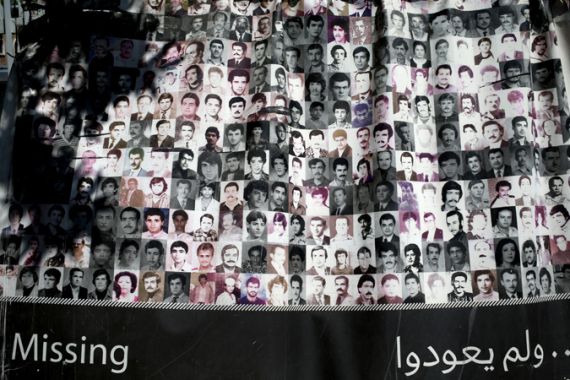Lebanon marks civil war anniversary
As Lebanon marks 39 years since the start of the country’s civil war, many feel that sectarian divides still run deep.

Beirut, Lebanon – During the Lebanese civil war, the Beirut National Museum (al-Mathaf, in Arabic) stood as a landmark on the dividing line between the city’s Christian-controlled east, and Muslim-controlled west.
On Sunday, people in the Lebanese capital gathered for a prayer vigil on the museum’s steps to mark the 39th anniversary of the start of the country’s bloody civil war.
“We are holding this activity to strengthen the civil peace,” Samer Mokarzil, one of the event organisers and a member of local group Joy of Giving, told Al Jazeera.
Enduring for 15 years, between 1975 and 1990, the war left around 200,000 people dead and an estimated 17,000 others missing. The Israeli army also occupied Lebanon during and after the war, only withdrawing its troops in 2000.
After the vigil, Lebanese citizens of all denominations marched towards parliament, where five children – from Tripoli, Bab al-Tibani and Jabal Mohsen – to deliver a bouquet of flowers to parliament members. “The Lebanese civil war is a painful memory, so we are trying to change this image that carries so much pain in the Lebanese society,” Mokarzil said.
RELATED: Syrian war intensifies Lebanon’s divisions
The Taif agreement, brokered in Saudi Arabia, put an end to the Lebanese civil war in 1990. It resulted in a redistribution of political roles between the warring factions, and aimed to establish equal representation for Christians and Muslims in the government.
”Today
people were divided.”]
The agreement also brought Syrian security forces to Lebanon to act as a peacekeeping force. The Syrian troops were forced out of the country in 2005 after the assassination of Rafik Hariri, Lebanon’s former prime minister.
But many in Lebanon feel that the civil war never really ended.
“We are still divided and each sect still stands behind their leaders,” 31-year-old Ahmad Ossaili, who lives in Beirut’s Mousitbi area, told Al Jazeera. “Today people keep to their areas. No one is feeling safe, just like the time of the civil war [when] people were divided.”
A recent spate of car bombings, a sluggish economy and ongoing violence in Tripoli have raised fears of a return to widespread sectarianism in Lebanon. The war in neighbouring Syria has also raised concerns of a spillover of fighting.
Some also believe that the dividing lines have shifted; while the fighting was largely between Christians and Muslims during the civil war, new fault lines have emerged between Sunni and Shia Muslims in Lebanon.
“Before the civil war, Christians and Muslims did not hate each other. Our childhood neighbours were Christians, but two years after the war began they moved to east [Beirut],” recalled Mohammad Mogharbel, 58, as he sipped Turkish coffee outside his grocery store in Beirut’s Aysha Bakar neighbourhood.
“Nowadays, I keep telling my youngest son, it is just the same sentiments as the days before 1975. [The] only difference is today it’s Sunni against Shia, Muslim against Muslim.”
VIDEO: Lebanon’s women warriors
Members of the Secular Club at the American University in Beirut (AUB) also organised several events in the lead-up to this year’s civil war anniversary, including photography exhibits, film screenings, and talks by Lebanese political scientists and government figures from the time of the civil war.
The closing event, on Monday, will be a discussion between Assaad Chaftari and Muhieddine Chehab, former fighters who belonged to opposite groups during the civil war.
“This is the purpose – to start talking about issues… It’s not really about taking sides, but [looking at] what happened,” explained Joey Ayoub, a Beirut-based blogger and activist, and former member of the AUB Secular Club.
He explained that many people in Lebanon are tired of discussing the events of the civil war, but that dialogue is crucial to move on from what happened.
“We sort of have today a taboo, at least in my generation, when it comes to discussing the civil war because it’s something that’s not yet finished. We don’t know who the good guys are, who the bad guys are, and we don’t dare discuss it much,” Ayoub told Al Jazeera.
RELATED: Syrian refugees his million mark in Lebanon
We will never be able to live in peace in Lebanon as long these politicians are ruling us.
Polarisation also led to a long-lasting stalemate in Lebanese politics, as the various political blocs were unable to form a coalition government for more than 10 months. Once finally formed, in February 2014, the government took a month to release its policy statement, which forms the basis of the state.
The March 8 political alliance is led by Lebanese resistance group Hezbollah and Christian leader Michael Aoun of the Free Patriotic Movement. The group insisted that the policy statement emphasise the right of Lebanon and the Lebanese people to resist the Israeli occupation of the Lebanese border areas of Ghajar and Sheba Farms, and defend Lebanon from Israeli violations of Lebanon’s sovereignty.
Meanwhile, the Future Party, which leads the March 14 political alliance, had demanded that resistance to Israel be carried out only by the Lebanese army and wants the clause on resistance omitted from the statement.
For many young people in Lebanon, the polarisation leaves little hope for the future.
“We will never be able to live in peace in Lebanon as long these politicians are ruling us,” said Maya Sallam, 28, a graphic designer who lives in Aramoun, a coastal village south of Beirut.
Twenty-one-year-old university student Samer Awada agreed. “I feel the next civil war is waiting to happen, and I am planning to finish university this year and leave Lebanon while I still can,” he told Al Jazeera. “This summer will be another summer without tourists [and] people like me cannot find jobs in Lebanon if the situation continues to escalate.”